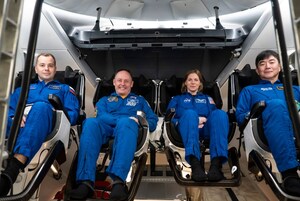
HAMPTON, Va., April 16, 2018 /PRNewswire-USNewswire/ -- A NASA scientist who was a lead author on the U.S. Global Change Research Program's 2017 Climate Science Special Report will give a talk about it Monday, April 23, at NASA's Langley Research Center in Hampton, Virginia.
Patrick Taylor, a research scientist at Langley, will give his talk, "Taking Earth's Pulse: A Guide to the 2017 Climate Science Special Report," at 1:30 p.m. in the Pearl Young Theater. Prior to the lecture at 1 p.m., he'll be available for interviews.
Taylor will discuss the report's key findings and share his experiences as a lead author.
Some key findings in the report, released in November 2017, include:
- Global climate continues to change rapidly compared to the pace of the natural variations in climate that have occurred throughout Earth's history.
- The frequency and intensity of extreme heat and heavy precipitation events are increasing in most continental regions of the world.
- Annual average near-surface air temperatures across Alaska and the Arctic have increased over the last 50 years at a rate more than twice as fast as the global average temperature.
- Human-caused climate change has made a substantial contribution to global mean sea level rise since 1900, contributing to a rate of rise (7 to 8 inches) that is greater than during any preceding century in at least 2,800 years.
NASA is one of 13 federal agencies that contributed significantly to the report.
Taylor received his doctorate in meteorology from Florida State University in 2009 and has worked at Langley since. He received a Presidential Early Career Award for Scientists and Engineers in 2012. In 2013, his research earned him a NASA Early Career Achievement Medal. In 2015, he became a National Academy of Science Kavli Fellow. Taylor was appointed to the Virginia Climate Change and Resiliency Commission by former Gov. Terry McAuliffe. He's also a member of the science working group for the Old Dominion University led Sea Level Rise Initiative.
Taylor's research at Langley focuses on understanding cloud behavior, which provides valuable information for improving weather and climate models. He's a member of Langley's Clouds and Earth's Radiant Energy System science team, leads the climate processes and diagnostics research group, and serves as a member of the Langley Science Directorate's 10-year planning committee as co-lead for the radiation budget focus area.
SOURCE NASA







Share this article